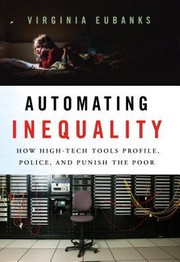Check nearby libraries
Buy this book

A powerful investigative look at data-based discrimination—and how technology affects civil and human rights and economic equity
The State of Indiana denies one million applications for healthcare, foodstamps and cash benefits in three years—because a new computer system interprets any mistake as “failure to cooperate.” In Los Angeles, an algorithm calculates the comparative vulnerability of tens of thousands of homeless people in order to prioritize them for an inadequate pool of housing resources. In Pittsburgh, a child welfare agency uses a statistical model to try to predict which children might be future victims of abuse or neglect.
Since the dawn of the digital age, decision-making in finance, employment, politics, health and human services has undergone revolutionary change. Today, automated systems—rather than humans—control which neighborhoods get policed, which families attain needed resources, and who is investigated for fraud. While we all live under this new regime of data, the most invasive and punitive systems are aimed at the poor.
In Automating Inequality, Virginia Eubanks systematically investigates the impacts of data mining, policy algorithms, and predictive risk models on poor and working-class people in America. The book is full of heart-wrenching and eye-opening stories, from a woman in Indiana whose benefits are literally cut off as she lays dying to a family in Pennsylvania in daily fear of losing their daughter because they fit a certain statistical profile.
The U.S. has always used its most cutting-edge science and technology to contain, investigate, discipline and punish the destitute. Like the county poorhouse and scientific charity before them, digital tracking and automated decision-making hide poverty from the middle-class public and give the nation the ethical distance it needs to make inhumane choices: which families get food and which starve, who has housing and who remains homeless, and which families are broken up by the state. In the process, they weaken democracy and betray our most cherished national values.
This deeply researched and passionate book could not be more timely.
Check nearby libraries
Buy this book

Subjects
Poor, Services for, Poverty, Data processing, Poor, united states, New York Times reviewed, COMPUTERS / Social Aspects, POLITICAL SCIENCE / Public Policy / Social Services & Welfare, SOCIAL SCIENCE / Poverty & Homelessness, SOCIAL SCIENCE / Social Classes & Economic Disparity, Poor--services for--data processing, Poor--services for--united states--data processing, Poverty--united states, Hc79.p6 e89 2018, 362.5/60285| Edition | Availability |
|---|---|
| 1 |
zzzz
|
|
2
Automating Inequality: How High-Tech Tools Profile, Police, and Punish the Poor
2018, St. Martin's Press
1250074312 9781250074317
|
aaaa
|
Book Details
Classifications
Edition Identifiers
Work Identifiers
Source records
marc_openlibraries_sanfranciscopubliclibrary MARC recordamazon.com record
Better World Books record
Better World Books record
marc_columbia MARC record
Promise Item
marc_nuls MARC record
ISBNdb
Links outside Open Library
Community Reviews (0)
History
- Created February 3, 2019
- 12 revisions
Wikipedia citation
×CloseCopy and paste this code into your Wikipedia page. Need help?
| December 20, 2023 | Edited by ImportBot | import existing book |
| March 7, 2023 | Edited by MARC Bot | import existing book |
| January 14, 2023 | Edited by ImportBot | import existing book |
| December 17, 2022 | Edited by MARC Bot | import existing book |
| February 3, 2019 | Created by vickypix91 | Added new book. |










